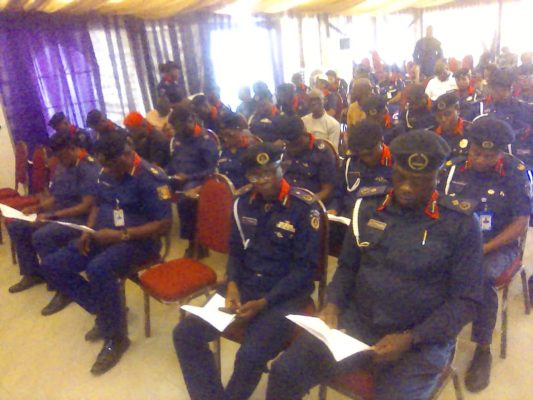Stakeholders in the security sector in Cross River State have reaffirmed their commitment to stronger collaboration among security agencies to ensure the effective protection of critical national assets and infrastructure in the state.
The commitment was made by the heads of the various security agencies and owners and operators of critical infrastructure in the state at the State-Level Security and Stakeholders Coordinating Interface Meeting on the protection of Critical National Assets, held on Thursday in Calabar, the state capital.
In a brief, the State Commandant of the NSCDC, Cross River State Command, Dr. Charles Brown, explained that the meeting was convened at the directive of the Office of the National Security Adviser (ONSA) to provide a platform for security agencies to deliberate and share strategies on safeguarding vital installations across the country.
He stressed that as the lead agency responsible for critical infrastructure protection, the NSCDC could not achieve its mandate in isolation but required the cooperation of other security agencies to be successful.
“We have to come together, put our hands together, and work towards achieving the same goal,” he urged.
According to him, without the collective efforts of all stakeholders, the task of protecting critical infrastructure will remain a significant challenge.
In his contribution, the Federal Mines Officer (FMO) in Cross River State, Engr. Ayelabola Bumi, called for stronger action against illegal mining in the state. He commended the existing synergy between the state command of the NSCDC and the Federal Ministry of Solid Minerals, describing it as a meaningful step in addressing the sector’s challenges.
Engr. Bumi described the solid minerals sector as a “strategic area” that required robust protection due to issues such as revenue leakages and environmental degradation caused by illegal mining activities.
He also expressed appreciation for the contributions of other security agencies, including the police, DSS, Immigration, and others, in the fight against illegal mining, which he described as a major threat to the nation’s critical assets.
“Illegal mining is predominant. We hope that from this discussion, a clear roadmap will emerge to reduce the menace to the barest minimum,” he stated.
Mr. Bumi reaffirmed the ministry’s commitment to working closely with security agencies to safeguard the solid minerals sector and protect national resources.
Representatives of various security agencies present at the meeting described the protection of critical infrastructure as a shared responsibility. They pledged their continued support and collaboration with the NSCDC to secure critical assets across Cross River State.
Owners and operators of critical infrastructure in the state who spoke commended the various security agencies for their efforts in the protection of critical national assets and infrastructure and called for a reorientation and sensitisation of citizens on the need to protect these facilities in the interest of all.
The Paramount Ruler of Calabar South Local Government Area, Etubom Nyong Effiom Okon Etim Ewa I, called on citizens not to see national assets and infrastructure as government property but to protect them because they are the ones who will suffer from the vandalisation of such facilities.
 The monarch, represented by the Clan Head of Efut Uwanse Clan, Muri Ika-Ika Oqua, called for the incorporation of traditional rulers into the security architecture of the state, as they are the ones closest to the grassroots.
The monarch, represented by the Clan Head of Efut Uwanse Clan, Muri Ika-Ika Oqua, called for the incorporation of traditional rulers into the security architecture of the state, as they are the ones closest to the grassroots.
In a seven-point communique reached at the end of the meeting, there was a consensus by all security agencies on the joint enterprise of the protection of critical national assets and infrastructure in the state.
The Nigeria Police, in its avowed commitment, stressed its resolve to sustain already existing deployments across critical national assets and infrastructure beats across the state, while the Defense Intelligence Agency (DIA) and the Department of State Security (DSS) also reiterated their commitment to the timely dissemination of intelligence to curb vandalism.
The role of the Nigerian Army was streamlined to the profiling and cataloguing of all critical national assets and infrastructure in their area of responsibility and advocacy for the formation of a joint task force of security agencies to further the campaign against vandalism.
The National Drug Law Enforcement Agency (NDLEA) made a clear connection between the illicit drug industry and criminality and therefore pledged its avowed commitment to address the business of distribution, movement, sale, and use of illicit drugs.
The owners and operators of various critical national assets and infrastructure advocated for the need for the security agencies to display high patriotism and synergy with vigilante groups and communities, and also called for inter-agency collaboration between the rank and file of various security services.
The stakeholders further called for more efforts at sensitisation of the citizenry on the need to safeguard and protect critical national assets and infrastructure, and the need to incorporate critical national assets and infrastructure studies into the primary, secondary, and tertiary institutions’ curricula.






